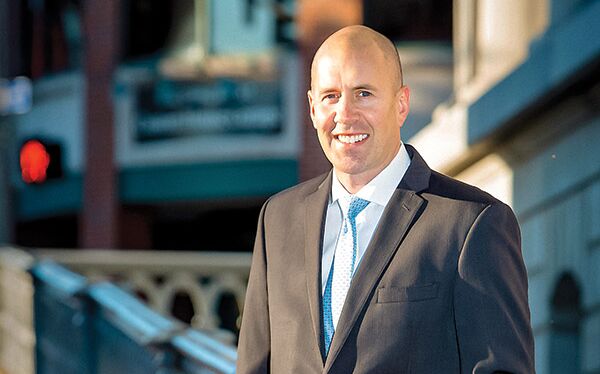More banks enter Portland market — each having bold growth ambitions
Commercial banking in Portland is revved up for its next act with two industry stalwarts — one global, one from Downeast — setting up new offices and teams here.
One is JPMorgan Chase & Co., the U.S. market leader with $2.6 trillion in assets, which is on a major branch-expansion tear into new markets. In Portland it hired 20-year industry veteran Michael Griffin, most recently with Citizens Financial Group Inc., as a new middle-market banking executive director.
The other is Bar Harbor Bank & Trust, Maine's third-largest bank and the only one with a presence in three New England states but no retail branch in Maine's biggest city. It hired former NBT Bank executives Daryl Wentworth and Joe Delano to open a new commercial loan office in Portland.
Both institutions have newly planted flags in the Old Port, JPMorgan at 111 Commercial St. and Bar Harbor Bank & Trust at 75 Market St. They're geared up to take on entrenched rivals with bold client development and hiring plans, and for what one JPMorgan executive sees as a battle of endurance.
“It's a fist-fight out there,” says Richard J. MacDonald, the Boston-based managing director for middle-market banking who hired Griffin. He says while he knows it'll be tough trying to win new business, JPMorgan is here to stay. “We'll be in the fray as long as we need to be,” he says.
Curtis Simard, Bar Harbor Bank's president and CEO, is equally psyched about having a Portland presence with a commercial lending “calling-card.”
“We're a long way from being done in terms of our growth and brand expansion efforts,” Simard says.
While JPMorgan has had clients in Maine for about 10 years, and a Boston commercial banking office that opened seven years ago, having a Portland presence is part of a company-wide push into new markets.
“Though they're a large bank, they have the ability to focus on middle-market customers,” Gerard Cassidy, a Portland-based banking analyst with RBC Capital Markets, says of JPMorgan. “I would certainly expect them to be a very viable competitor in this marketplace. It's good for consumers and it's good for business to have an additional competitor such as a JPMorgan Chase.”
A competitive landscape
With JPMorgan's arrival, the nation's three largest banks now have a presence in Portland. The others are Bank of America Merrill Lynch and Wells Fargo, which opened a commercial banking office in Portland in 2016.
Raymond T. (Chip) Kelley, KeyBank's Maine market president, sees JPMorgan's move as a testament to the health of Maine's economy, “stronger and deeper” than at any time during his 30-year-plus banking career.
“Capital follows success and we've had a great run during this most recent, long economic expansion,” he says, noting that KeyBank's Maine-based commercial team has doubled in size over the last decade. “Maine-based companies will continue to benefit from the addition of new sources of capital.”
Not to be outdone by its larger peers, Lewiston-based Androscoggin Bank will open a Portland commercial lending and cash management office by year's end, at 100 Middle St. Bank President Neil Kiely, who will also have an office there, says there will be an initial team of eight to 10 with more hires in mind, adding: “We're always looking for great people.”
The 'full force of JPMorgan'
For JPMorgan, the Portland move comes as part of a five-year branch expansion plan into 15 to 20 new markets, including a Northeast Corridor presence in Washington, Philadelphia and Boston. Like many peers, it's also investing heavily in technology.
“We are extremely excited to be expanding again,” CEO and Chairman Jamie Dimon declared earlier this month with third-quarter results. “Every time we open branches in a new market, we bring the full force of JPMorgan Chase to that community.”
Griffin, JPMorgan's new executive director in Portland, has spent his first few months doing just that, in what's been “overwhelming in a good way.”
“It's one part recruiting, one part networking,” he says before heading to a meeting with a job prospect who found him through LinkedIn.
While the ability to draw from JPMorgan's 250,000-strong company-wide talent pool eases the hiring pressure, winning new business will be a harder slog.
“Most bankers give up after just a few calls because they haven't sold something, when statistically you're into the seventh call before you're actually delivering something you can get paid for,” says Griffin, who is also a marathon runner and surfer. Even before the first call to a potential client, Griffin says it's important to study up on a company, and stay current and ready to answer questions at any time. “You have to be very persistent.”
Analyst Cassidy sees JPMorgan's main strengths as an “unparalleled” breadth of service, good management and knowledge of winning new business.
While commercial banking doesn't require the economies of scale that retail demands, Cassidy urges new entrants in any new market to expand with caution, and not be overeager to take on clients that competitors are seeking to offload.
“They have to stick to their guidance for underwriting, and not bend the rules to win new market share,” he says. “You don't want to give away the store to win new business. It could come back to haunt you in the next credit cycle.”
JPMorgan is entering a market where retail banking is well-served and highly fragmented. More than half of the Portland market's deposits, 51%, are held by the top four — TD Bank, Bank of America, KeyBank and People's United Bank.
Like KeyBank's Kelley, top brass at other lenders see JPMorgan's arrival as more of a validation of what they're doing than a threat.
“Every bank is looking to grow these days,” says Larry Wold, Maine state president of TD Bank. Another distance runner, Wold likens the commercial banking market to a crowded field of cross-country runners. “If you have 102 people instead of 100 it doesn't feel dramatically different to have them come in here.”
And at Bank of America, with five commercial banking relationship managers covering Maine, state President Bill Williamson notes they're already competing against JPMorgan. “The only difference is now they have a physical presence,” he says. He also notes that it's not unusual to be on the same side of the table for larger debt deals, adding: “We're used to working together.”
The bank from Downeast
Simard, the leader of Bar Harbor Bank, said his institution would not have moved into Portland without Wentworth and Delano.
“We feel banking is entirely a personal relationship business,” he says. “If we couldn't have gotten the people we wanted, we wouldn't have done it.”
Wentworth's background includes 24 years as a commercial lender in southern Maine and 17 years at Citizens Bank, where he first crossed paths with Simard, while Delano's resume lists TD Bank, Camden National Bank and Bangor Savings Bank. At NBT Bank in Portland, Wentworth was regional commercial banking manager and Delano was a senior commercial relationship manager.
While Bar Harbor Bank's Portland focus will be on middle-market clients and real estate projects, Simard says that won't preclude the team from going after deals smaller than $1 million, saying: “We're really going to turn them loose to go after anything they want.”
Wentworth is up for the challenge, and underscores that while a lot of banks have moved into Portland in the last five years as complete newcomers, Bar Harbor already has a “good book of business” in southern Maine.
“We've got a head start on really digging our feet in the market.”
Within the first year Simard sees the new Portland team growing to half a dozen, then to 10 to 12.
While Bar Harbor Bank highlights its Maine roots, RBC's Cassidy notes that it may be still viewed in Portland as a bank “from away” but says that it could be of interest to Portland businesses who are regional in their approach to banking.
And what about smaller community lenders like Gorham Savings Bank?
“The advantage we have as a community bank is being agile and having the ability to be there when a customer has a challenge and or an immediate need arises,” says Kim Donnelly, Gorham Savings senior vice president and director of business banking
Gorham Savings employs 12 commercial and business banking lenders and has had an opening for a senior credit analyst for some time.
For commercial bankers looking for work, Portland is fertile hunting ground.

















Comments